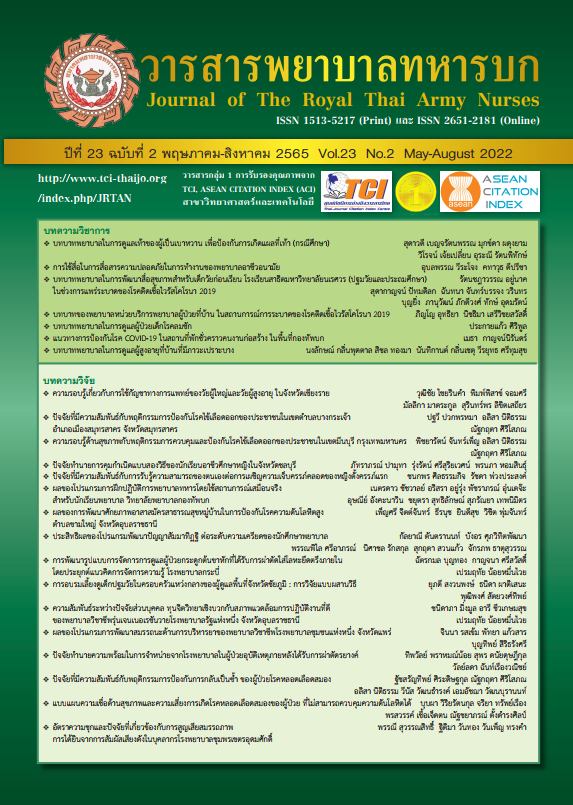Factors Associated with Medication Administration of Home-Based Patient by Caregiver
Keywords:
medication administration at home, patient, caregiverAbstract
This study is a cross-sectional study that aims to study factors relating to drug administration of home patients by using a sample group of patients and caregivers referred to the home health care unit. 70 samples are selected by purposive sampling. Research instruments used include a questionnaire for general information of patients and caregivers, an evaluation form for ability to do daily routines and a monitoring form for drug administration error at home. The inter rater reliability is found to be 0.68 – 0.79 and 1.00, respectively. Data is analyzed using descriptive statistics and Chi-Square (χ2) test statistics
From the analysis of the patient factor relating to home drug administration based on 6Rs, it is found that gender and the amount of drug are significantly correlated with the right dose medication at the statistical level of .05 (χ2 = .020 and χ2 = .02, respectively). Comorbidities and the amount of drug are significantly correlated with the right patient medication at the statistical level of .05 (χ2 = .037 and χ2 = .042, respectively). As for the caregiver factor, it is found that the age of caregiver is significantly correlated with the right time medication at the statistical level of .05 (χ2 = .021). This study finds that a dependent elderly patient with medication or a higher number of comorbidities need a main caregiver to help with home drug administration in order to reduce the drug administration error.
Downloads
References
World Health Organization (WHO). (2016). Medication Error: Technical Series on Safer Primary Care. Department of Service Delivery and Safety. Geneva Switzerland. 7-8.
Sereewichayasawad N, Sriprasarn P. The roles of home health care nurse in the university hospital. Journal of public health nursing 2014;28(2):92-108.
The Healthcare Accreditation Institute (Public Organization). Hospital and healthcare standards 4th edition. Nonthaburi: The Healthcare Accreditation Institute (Public Organization); 2018.
Ayani N, Oya N, Kitaoka R, Kuwahara A, Morimoto T, Sakuma M, et al. Epidemiology of adverse drug events and medication errors in four nursing homes in Japan: the Japan Adverse Drug Events (JADE) Study. BMJ Qual Saf. 2022;1–10.
Josendal AV, Bergmo TS, Granas AG. Potentially inappropriate prescribing to older patients receiving multidose drug dispensing. BMC Geriatr. 2020;20(1):272.
Ruangritchanku S. Polypharmacy in the elderly. Ramathibodi Medical Journal. 2018;40(1): 95-104.
Härkänen M, Vehviläinen-Julkunenb K, Murrells T, Rafferty AM, Franklind BD. Medication administration errors and mortality: Incidents reported in England and Wales between 2007-2016. Research in Social & Administrative Pharmacy. 2019;15(7): 858–863.
Rasool MF, Rehman AU,Imran I,Abbas S, Shah S,Abbas G, et al. Risk Factors Associated With Medication Errors Among Patients Suffering From Chronic Disorders. Front Public Health. 2020; 8:531038.
Busa G, Burlina A, Damuzzo V, Chiumente M, Palazzo AC. Comorbidity, polytherapy, and drug interactions in a neurological context: an example of a multidisciplinary approach to promote the rational use of drugs. J Pharm Pract. 2018;31:58–65.
SheikhUday D, Mateti UV, Kabekkodu S, Sanal T. Assessment of medication errors and adherence to WHO prescription writing guidelines in a tertiary care hospital. Future Journal of Pharmaceutical Sciences. 2017; 3(1): 60-64.
Cohen J. Statistical power for the behavioral sciences. 2nd ed. New York: Academic Press;1977.
Jitapunkul S. Principles of geriatric medicine. Bangkok:Chulalongkorn University;2011. (in Thai)
Bales, R.F., Parsons. Family:Socialization and Interaction Process. 1st ed. British: Routledge; 1956.
Saichamchan S, Undara W, Boonbunjob U, Thinsorn R. Health Literacy and Health Behavior 3E 2Sof People in Baan Aurarthorn Community Bangkhen (Klong thanon). Journal of The Royal Thai Army Nurses. 2021;22(3):376-386.(in Thai)
Vudhironarit S, Pommala W. The Caring for Bedbound Old Adult: A Systematic Review. Journal of The Royal Thai Army Nurses. 2021;22(3):367-375.(in Thai)
Utthiya P. Role of Home Care Nurses for Older Adults with End Stage Cancer. Journal of The Royal Thai Army Nurses. 2020;21(1):18-25. (in Thai)
Janković SM, Pejčić AV, Milosavljević MN, Opančina VD, Pešića NV, Nedeljković TT, et al. Risk factors for potential drug-drug interactions in intensive care unit patients. J Crit Care. 2018;43:1–6.
Kovačević M, Kovačević SV, Miljković B, Radovanović S, Stevanović P. The prevalence and preventability of potentially relevant drug-drug interactions in patients admitted for cardiovascular diseases: a cross-sectional study. Int J Clin Pract. 2017;71(10):e13005.
Avery T, Barber N, Ghaleb M, Franklin BD, Armstrong S, Crowe S, et al. Investigating the Prevalence and Causes of Prescribing Errors in General Practice: the Practice Study. General Medication Council. 2012;1-227.
Pattanajak C. Medication Adherence in elderly patients with chronic disease at Lad Pattana Health Promoting Hospital, Muang District, Mahasarakham Province. Mahasarakham Hospital Journal. 2019;16(3):13-22.
Downloads
Published
How to Cite
Issue
Section
License
Copyright (c) 2022 Journal of The Royal Thai Army Nurses

This work is licensed under a Creative Commons Attribution-NonCommercial-NoDerivatives 4.0 International License.
บทความหรือข้อคิดเห็นใดใดที่ปรากฏในวารสารพยาบาลทหารบกเป็นวรรณกรรมของผู้เขียน ซึ่งบรรณาธิการหรือสมาคมพยาบาลทหารบก ไม่จำเป็นต้องเห็นด้วย
บทความที่ได้รับการตีพิมพ์เป็นลิขสิทธิ์ของวารสารพยาบาลทหารบก
The ideas and opinions expressed in the Journal of The Royal Thai Army Nurses are those of the authors and not necessarily those
of the editor or Royal Thai Army Nurses Association.






